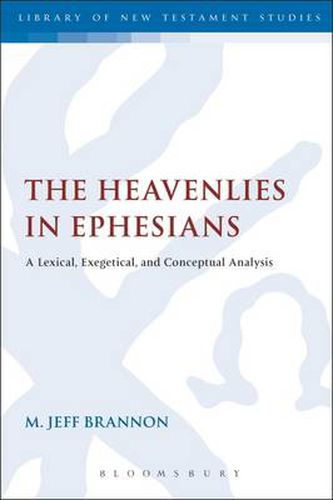Readings Newsletter
Become a Readings Member to make your shopping experience even easier.
Sign in or sign up for free!
You’re not far away from qualifying for FREE standard shipping within Australia
You’ve qualified for FREE standard shipping within Australia
The cart is loading…






The expression in the heavenlies appears five times in Ephesians and is not found at any other point in the New Testament. The two appearances which have provoked the most debate are the session of earthly believers in 2:6 and the presence of the spiritual forces of evil in 6:12.
M. Jeff Brannon conducts a lexical, exegetical, and conceptual analysis of the expression arguing against the prevailing interpretation of the term and provides in-depth examinations of three significant concepts associated with it; namely the redeemed on earth having a heavenly status, evil powers in heaven, and the cosmology of Ephesians. Brannon uses a wide range of souces; Greek, Jewish, the Apostolic Fathers, and the Septuagint. Brannon concludes that there is no basis for a distinction between the terms ‘heavens’ and ‘in the heavenlies’ in Ephesians . He also asserts that Qumran and apocalyptic texts can shed light upon and assist in a proper understanding of the difficult passages in which the expression appears.
$9.00 standard shipping within Australia
FREE standard shipping within Australia for orders over $100.00
Express & International shipping calculated at checkout
The expression in the heavenlies appears five times in Ephesians and is not found at any other point in the New Testament. The two appearances which have provoked the most debate are the session of earthly believers in 2:6 and the presence of the spiritual forces of evil in 6:12.
M. Jeff Brannon conducts a lexical, exegetical, and conceptual analysis of the expression arguing against the prevailing interpretation of the term and provides in-depth examinations of three significant concepts associated with it; namely the redeemed on earth having a heavenly status, evil powers in heaven, and the cosmology of Ephesians. Brannon uses a wide range of souces; Greek, Jewish, the Apostolic Fathers, and the Septuagint. Brannon concludes that there is no basis for a distinction between the terms ‘heavens’ and ‘in the heavenlies’ in Ephesians . He also asserts that Qumran and apocalyptic texts can shed light upon and assist in a proper understanding of the difficult passages in which the expression appears.